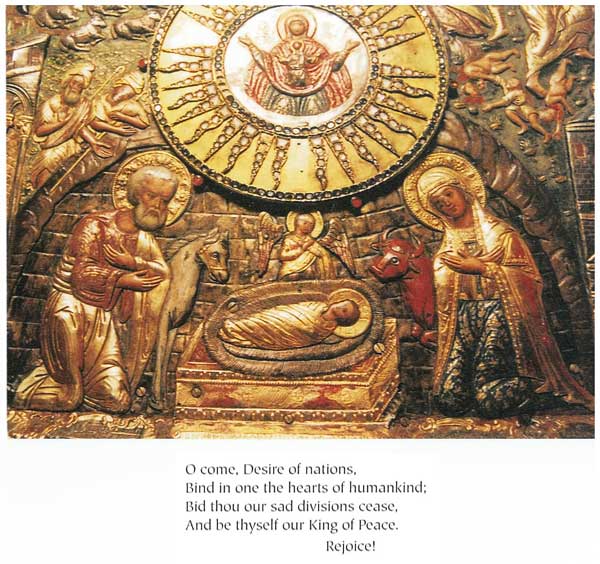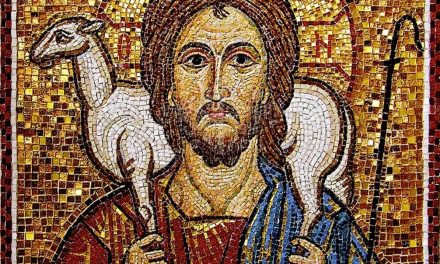Isaiah 7:10—14
Psalm 24
Romans 1:1-7
Matthew 1:18-24
This last week of Advent, we dwell upon the historical details of Jesus’ birth. Yet we dwell upon this event not merely as a matter of historical importance, but as the central turning point in the drama of human salvation. For Christians, what takes place in Bethlehem is the definitive moment in a revolution, but again it would no suffice to categorize this revolution as either “political” or “spiritual” in nature. It is, in a sense, the final revolution of human history.
Some may find the use of the word “revolution” dangerous or unhelpful, evocative of a bygone ideological age. “We don’t have revolutions anymore,” some may say. “We live in an age that has inoculated itself to fundamental shifts in global perspective and social organization.” Such is an attitude all too indicative of one living within the firmly established status quo: little changes here or there, OK, but the basic paradigm is both immutable and inevitable.
From my vantage point in the United States in the early 20th century, this is precisely the outlook I detect in the vast majority of the university students I teach. It is also the symptom of a polity that is ripe for revolution. For it is the defining mark of a revolution that it is inconceivable to those living with the social world that is opposed and “turned around” by it. A true revolution is quite literally unimaginable to those who stand in most need of it. Its intelligibility appears only after the fact, even (and perhaps especially) to those who bring it about.
And so it seems to me that the contemporary context I inhabit is just as ripe for the revolution begun in Bethlehem as the Pax Romana of Augustus Caesar. There is so much static, so much commercialism, so many spasms of anxiety about items on the checklist to be crossed off before Christmas—we insulate our imaginations from the radicality of the revolution we are (perhaps unknowingly) celebrating. The “countdown” of days takes on an almost apocalyptic quality, as if a cataclysmic event is on the immediate horizon and preparations must be made before we must all take shelter and hope for the best.
It is thus ironic that those caught up in the commercial whirlwind preceding Christmas (I would hesitate to exclude myself from their number) are in fact preparing for what the Christian faith takes to be the most monumental and definitive revolution the world has ever known. Not only are most within the bourgeois world unable to imagine the scope of this revolution, but the immediate aims of our frantic activities are in a sense directly opposed to the revolutionary event we are seemingly preparing to commemorate.
The revolution established by Jesus Christ not only challenges and upends political and economic arrangements; nor does it merely reorient and expand the scope of human kinship, though it certainly has these effects. It goes much deeper than all that, for it calls into question the ultimate boundary within which we construct our world and our identity: the finitude of love and the finality of death.
Josef Stalin touches upon this boundary quite poignantly in his famous quip that “death solves all problems: no person, no problem”; and it is a motto which he all too faithfully and brutally lived out. Death is the pillar that upholds the basic dynamic of fear, violence and domination that characterizes what the New Testament consistently refers to as “the world.” Death is the ultimate sovereign in this reality; it is the horizon against which all else comes to light. And for those who remain within the clutches of this regime, any alternative is unimaginable.
The vision of that alternative must necessary come from outside, from one who is not captive to the bonds of the old worldview permeated with death. Even around the holiday hearth or banquet table, this old world comes creeping in. What we so desperately seek around the holiday hearth or banquet table is all too often simply a respite from the impending absences of death, a temporary reprieve of communion within an endless vacuum of isolation. All too often what we yearn most for at Christmas is a moment of comfort, a brief spell of oblivion in which those we love are “here” and “OK.” But what Christmas in fact gives us is so much more: it is the ultimate revolution that liberates us from the need to seek such momentary consolations. (That is perhaps why I love so much the Slavic tradition of putting hay underneath the tablecloth– it is a reminder that lurking beneath the present scene of domestic tranquility is the poverty of the stable, seemingly ready to upend the place settings at any moment.)
The prophet Isaiah challenges us in the first reading to try to stretch ourselves to imagine the new, surprising and utter revolutionary reality that is breaking into our world with the Incarnation, which once here, never settles into a predictable pattern of progressive development. “Ask for a sign,” says the Lord, “deep as the netherworld, or high as the sky.” Try to imagine a reality you have never imagined before, and ask for it! But Ahaz is too tired and afraid to ask. Like the servant who buries his coin, he retreats into the comfort of the status quo. His response epitomizes acedia, in that it refuses the demands of love: his “I will not test the Lord” amounts to “I will not risk the vulnerability of exertion to reach out for the unanticipated gift you have to give me.”
I am reminded of my children’s constant refrain: “guess what, Daddy?” I used to think this phrase was simply another way of saying “I have something to tell you now, Daddy” but I have come to learn that they actually do want me to guess! It is a little frustrating, though, because I have absolutely no idea what to guess: “Er, you brought a snail into the house,” or “Um, you are pretending to be a lost tiger in need of a home.” Nevertheless, they delight in my fumbling guesses, because it means I am stretching my mind out to meet them, confirming that I do not in fact anticipate the gift of whatever they are about to tell me.
The Lord comes to us in a similar way each day, and especially in this season of Advent. “Guess what I have to give you?” he asks. Of course, we can never really guess, even if we think we have the words which might constitute a “correct” response (as Ahaz apparently thought).
“You have forgiven our sins?”… “Yes, but there’s something more.”
“You have laid out a path to true justice by opening up for us a new way of relating to one another?”… “Yes, but there’s even more.”
“What more could there be?”… “Take heart, for I have overcome the world!”




I love the idea of the incarnation as revolution. Reminded me of Pope Benedict’s call for a revolution of love.
http://www.catholicnewsagency.com/news/pope-calls-lebanese-youth-to-revolution-of-love/
God Bless
I really enjoyed this reflection. I am the chaplain at a monastery of Benedictine nuns and no doubt some of the thoughts here will make their way into my Sunday homily. Thank you. I am new to this website which I found while reading the NCR. I will check in on it weekly.
John Cahill